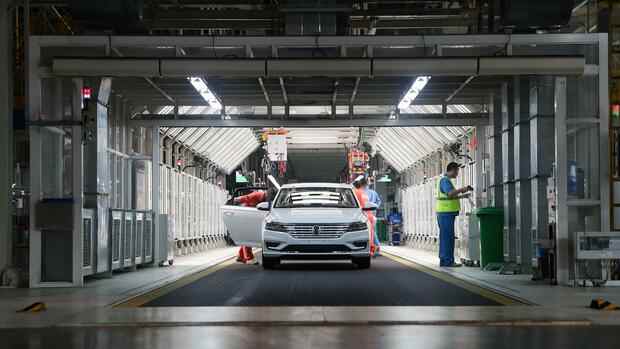The German car company is weakening in its most important market.
(Photo: dpa)
Beijing Volkswagen suffered a significant drop in sales in its most important single market last year. A total of 3.3 million vehicles were sold in China in 2021, said VW China boss Stephan Wöllenstein on Tuesday in Beijing. This corresponds to a decrease of 14 percent compared to the previous year.
The main reason for the slump in sales were problems in the supply chain, especially with the semiconductors that are essential for automobile production. “In terms of sales, it wasn’t the best year for Volkswagen,” said Wöllenstein.
According to the company, the demand for the cars was there, but VW was unable to deliver due to the chip shortages. 600,000 cars could not have been produced, said Wöllenstein.
The volume brand VW in particular suffered and lost market share. The market share of the VW brand in China, which in the past few years had always been 14 to 15 percent, fell to eleven percent, which is a “considerable loss”, according to Wöllenstein.
In the current year, China should “be given greater priority,” he promised. It was agreed with the joint venture partners in the People’s Republic that there would be no such situation as last year. For the current year, Volkswagen expects sales in the region to grow by around 15 percent. “What we lost disproportionately in the past year, we want to regain disproportionately this year,” said Wöllenstein.
Top jobs of the day
Find the best jobs now and
be notified by email.
Electric series ID especially under observation
In particular, the company’s performance in the field of electric cars is being watched with excitement. The company launched its first models on the huge market in 2021, but was only able to sell a total of 70,625 cars from the VW ID series from March to December. The company thus remained below the targets it had set for 80,000 to 100,000 vehicles.
VW expects sales to increase in the future segment for 2022, but Wöllenstein only wanted to commit to at least 140,000 VW e-cars. The manager was very cautious due to the continued tense situation in semiconductor supply and the uncertain corona situation in China.
At the weekend in Beijing’s neighboring city of Tianjin, locally transmitted cases of the highly contagious Omicron variant in the People’s Republic were registered for the first time. Thanks to a zero Covid strategy, which is being implemented successfully in large parts with draconian measures and strict entry restrictions, China has had significantly fewer cases than the rest of the world in recent months. Whenever cases arise anywhere, entire districts are cordoned off and mass tests are carried out. Companies or their suppliers have to shut down their production again and again.
Volkswagen has a plant in Tianjin as well as important suppliers who had to temporarily stop their production in the past few days. As the company says, these short-term failures are painful, but they can be made up if they don’t last too long.
In view of the spread of the new Omikron cases and the upcoming Olympic Games in Beijing, where thousands of people will come to China from abroad, VW expects further difficulties from the spread of Covid. “In addition to the general shortage of semiconductors, there will be short-term bottlenecks in connection with Covid, which can occur in the course of the year,” said Wöllenstein.
As VW had already announced, the 58-year-old’s days as China-VW boss are numbered. He will stay in the People’s Republic until the end of August, he said. Then around the middle of August, the current VW brand boss Ralf Brandstätter takes over. Wöllenstein then worked for VW in China for ten years.
More: China is cutting subsidies for e-cars in the new year.
